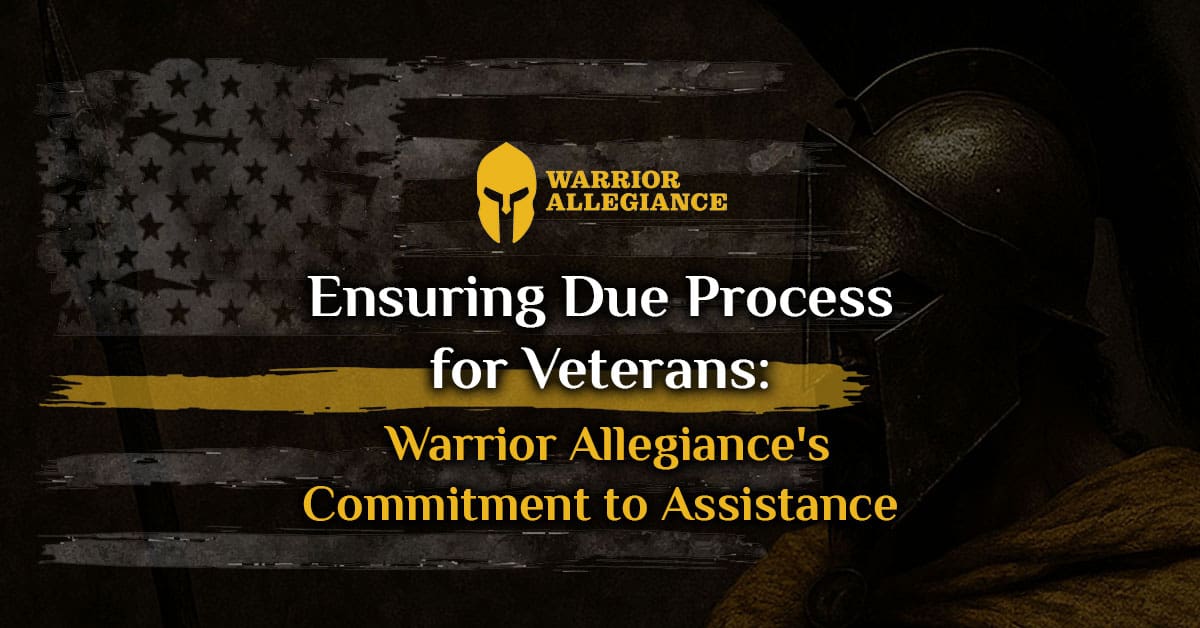Ensuring Due Process for Veterans: Warrior Allegiance's Commitment to Assistance
In the realm of Veterans’ benefits, due process is a fundamental aspect that ensures fairness and protection for our nation’s heroes. At Warrior Allegiance we are dedicated to facilitating the Disability Claim Process for all Veterans requiring assistance, it is our duty to shed light on how due process affects Veterans and their claims for benefits.
Understanding Due Process
Due process, as enshrined in the Fifth Amendment to the U.S. Constitution, is a vital legal concept that safeguards citizens’ rights. It declares that “No person shall be deprived of life, liberty or property without due process of law.” In the context of Veterans’ benefits, due process serves as a critical safeguard, ensuring that beneficiaries are treated fairly when facing proposed adverse actions that could reduce or terminate their benefits.
Due Process and VA Benefits
The Department of Veterans Affairs (VA) administers a wide range of benefits aimed at supporting Veterans and their families. In this system, due process plays a pivotal role by informing beneficiaries of any proposed adverse actions that may affect their benefits. These adverse actions may include benefit reductions or terminations.
When VA proposes such actions, due process comes into play. It provides beneficiaries with the opportunity to contest these actions, either by providing additional evidence to support their case or by requesting a hearing before VA decision-makers. It is important to note that due process primarily applies when VA intends to reduce or terminate a benefit, ensuring that Veterans have the chance to defend their claims adequately.
Types of Notification
To ensure that Veterans are well-informed about changes in their benefits, VA employs two types of notifications: the “notice of proposed adverse action” and “contemporaneous notice.”
Notice of Proposed Adverse Action
The notice of proposed adverse action is a formal communication from VA to a beneficiary, informing them of a proposed reduction or termination of their benefits. This notification serves as a critical step in the due process, allowing Veterans to understand the changes being considered and to respond accordingly.
Contemporaneous Notice
Contemporaneous notice, on the other hand, is a notification that informs beneficiaries of an immediate change in their benefits. This notification is sent out at the time when the change is implemented, ensuring that beneficiaries are promptly aware of any alterations to their benefits.
How Due Process Affects Veterans
For Veterans and their families, understanding due process is crucial, as it directly impacts their entitlement to benefits. It ensures that beneficiaries are not left in the dark about proposed actions that could affect their livelihoods. Due process affords Veterans the opportunity to provide additional evidence, contest decisions, and voice their concerns.
At Warrior Allegiance, we recognize the importance of due process in safeguarding Veterans’ rights and entitlements. Our organization is committed to assisting Veterans in navigating the Disability Claim Process, which can be complex and overwhelming. By providing support and guidance, we aim to ensure that Veterans receive fair treatment throughout their claims journey.
Entitlement to Notification
Beneficiaries are entitled to notification of any decision made by VA that affects the payment of benefits or the granting of relief. This entitlement extends to beneficiaries, fiduciaries of minor or incompetent beneficiaries, and beneficiaries’ designated representatives. It underscores the importance of transparency in the VA benefits system, ensuring that all parties involved are kept informed.
Definition of Third-Party Information
Third party information refers to any information that is not directly received from the beneficiary or their fiduciary. Written correspondence becomes third party information when it lacks the beneficiary’s signature or the signature of their fiduciary. This distinction is crucial as it helps determine the source and reliability of the information.
Examples of third-party informants include VA medical facilities, field examiners, and other possible sources such as VA computer matches, letters from friends and relatives, and reports from employers or other government agencies. The handling of third-party information is essential, as it can impact the decision-making process regarding a beneficiary’s benefits.
Warrior Allegiance's Commitment to Assistance
Warrior Allegiance’s team of dedicated professionals is well-versed in the intricacies of the VA benefits system. We work tirelessly to ensure that Veterans receive the assistance they require, helping them gather evidence, complete applications, and understand their rights. Our goal is to facilitate the claims process, making it more accessible and less daunting for those who have served our country.
Conclusion
In conclusion, due process is an indispensable aspect of Veterans’ benefits, guaranteeing fairness and transparency in the VA benefits system. As an organization deeply committed to assisting Veterans, Warrior Allegiance recognizes the significance of due process in protecting the rights and entitlements of our nation’s heroes.
Our mission is clear: to facilitate the Disability Claim Process for all Veterans requiring or seeking assistance. By providing support, guidance, and advocacy, Warrior Allegiance aims to ensure that Veterans receive the benefits they deserve. We are honored to stand alongside Veterans on their journey to securing the benefits they have earned through their dedicated service to our country.
https://warriorallegiance.com/fbgetstarted/

